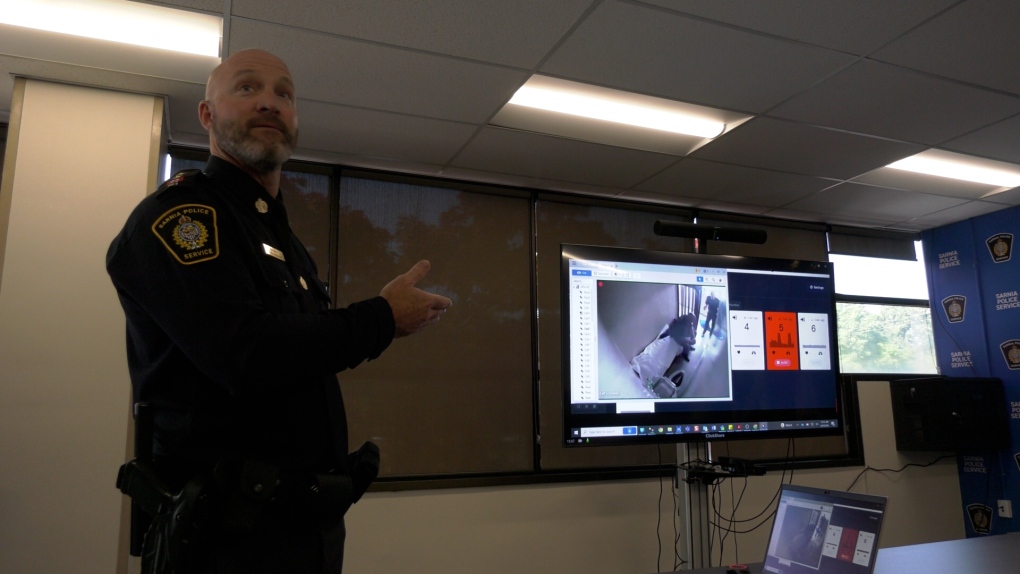New biometric monitoring technology in Sarnia police holding cells could help save lives
Sarnia’s police chief says new technology being used in holding cells will save lives.
The police service recently installed what’s called a biometric health monitoring system, which can alert officers to when a prisoner is having a medical emergency.
“The device alerts officers to provide immediate medical attention. And when that is provided in a timely manner it does save lives,” explained Chief Derek Davis.
Using radar technology, the system provides real-time monitoring of vital signs and movement patterns.
“We deal with a lot of people who may not be on their best days, and when they come into our custody we’re responsible for their health and safety,” said Davis.
In addition to loss of vital signs, the system can alert officers to conditions such as an irregular heartbeat, loss of lung function, or anything unusual, explained Insp. Michael VanSickle, one of the officers involved with the system’s implementation.
 Sarnia Police Insp. Michael VanSickle explains how the service’s new biometric health monitoring system works on June 24, 2024. (Bryan Bicknell/CTV News London)
Sarnia Police Insp. Michael VanSickle explains how the service’s new biometric health monitoring system works on June 24, 2024. (Bryan Bicknell/CTV News London)
“So medical distress looks different in today’s society,” said VanSickle. “We can have a prisoner in our cell who essentially doesn’t move for eight to 12 hours, and we would be required to wake them up, to arouse them, to make sure that they’re okay. And so what this technology affords us is to be able to monitor their vital signs while they’re motionless in our cells,” he said.
According to Davis, the proliferation of fentanyl throughout Ontario cities and towns has made the risk of overdose or overdose deaths while in custody that much greater, whether it’s at a provincial jail or simply in a police holding cell.
In 2023, Sarnia Police Service held 1,178 prisoners. When asked, 50 per cent of those who chose to respond admitted to consuming drugs or alcohol before being taken into custody. Three per cent said they were suicidal. Nineteen per cent answered ‘yes’ when asked if they’ve ever tried to harm themselves.
“So that adds a layer of stress to officers that are monitoring prisoners that we are seeing,” said Davis.
He added that the system does not record images or provide personal identifiers.
The new technology cost about $40,000 to install.
CTVNews.ca Top Stories

Trudeau, Carney push back over Trump's ongoing 51st state comments
Two senior members of the federal cabinet were in Florida Friday pushing Canada's new $1.3 billion border plan with members of Donald Trump's transition team, a day after Prime Minister Justin Trudeau himself appeared to finally push back at the president-elect over his social media posts about turning Canada into the 51st state.
Calgary Boxing Day crash victim identified, mother and sister still in hospital
A nine-year-old girl has died in hospital after the vehicle she was in was struck by a driver in a stolen vehicle fleeing from police.
B.C. man who flipped 14 homes in four years is fined $2M for tax evasion
A serial property flipper in British Columbia has been convicted of tax evasion and fined more than $2 million for failing to report nearly $7.5 million in earnings.
Gerry Butts says Trudeau less likely to remain leader since Freeland quit
A former chief adviser and close friend to Prime Minister Justin Trudeau said Friday he doesn't think Trudeau will stay on to lead the Liberals in the next election.
Missing dog returned to family home and rang the doorbell
After a nearly weeklong search, Athena, a four-year-old German Shepherd and Husky mix, found her way home to her Florida family in time for Christmas Eve and even rang the doorbell.
'Home Alone' director Chris Columbus explains how the McCallisters were able to afford that house
Audiences have wondered for years how the family in 'Home Alone' was able to afford their beautiful Chicago-area home and now we know.
'Nobody should have to go through that': N.B. family grieving father, daughter killed in crash
A New Brunswick family is grieving the loss of a father and daughter in a crash.
Five southern Ont. hunters fined $37K for moose hunt offences in northern Ont.
A multi-year moose hunting investigation resulted in five people being convicted of moose hunting offences and fined a total of $37,000, plus $9,250 in victim surcharges.
New York correctional officers pummelled handcuffed man before death, footage shows
Newly released video of a fatal New York prison beating shows correctional officers repeatedly pummelling a handcuffed man, striking him in the chest with a shoe, and lifting him by the neck and dropping him.

































